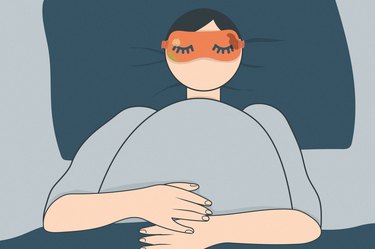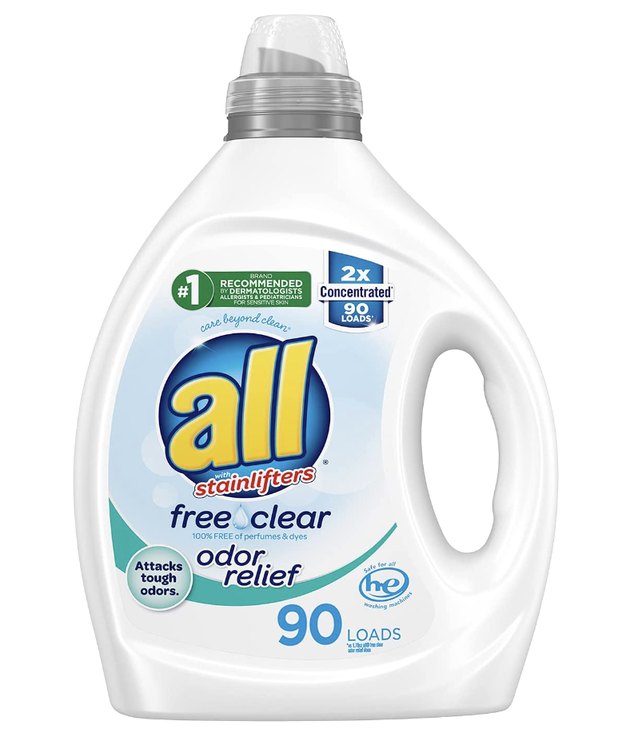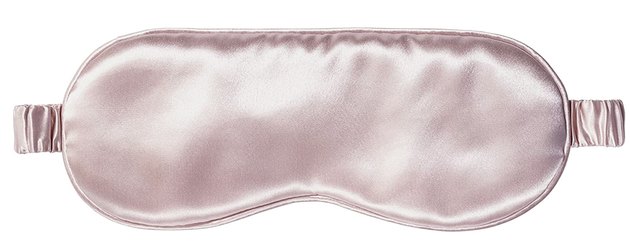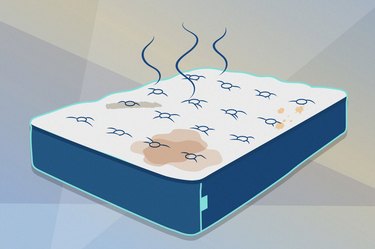
You wash your pajamas at least a couple times a week (well, hopefully). But what about that sleep mask you wear every night to get better sleep? How often is that getting tossed in the laundry?
If you thought to yourself, "rarely" or "never," those aren't quite the best answers.
Video of the Day
Video of the Day
Sure, re-wearing a dirty sleep mask every night won't likely cause major health issues, but it's still not doing your skin any favors.
Here, learn how often you should wash your sleep mask, and get tips on how to wash different kinds.
What Happens When You Never Wash Your Sleep Mask
Wearing an unwashed sleep mask night after night can leave your skin and eyes itchy, red, pimple-prone or generally uncomfortable.
After all, the dead skin cells, oils and sweat from your face transfer onto your mask while you're sleeping, even if you wash your face just before putting the mask on, says Marisa Garshick, MD, assistant clinical professor of dermatology at Cornell-New York Presbyterian Medical Center.
This can all build up as a layer of grime on the mask, which your skin comes into contact with each night.
That buildup "can contribute to skin irritation or breakouts," around your eyes or nose, Dr. Garshick says. It can also introduce bacteria to your eye area, she adds. And any time bacteria is hanging out near your eyes, it sets the stage for a potential infection.
That's especially true if your mask is made of a synthetic material like nylon, polyester or rayon, which can be particularly irritating to skin, according to the American Academy of Dermatology.
While there isn't much research looking at the effects of sleep masks in particular, there are some studies that explore the use of reusable cloth face masks. Turns out, the risk of your skin getting aggravated is higher than you think.
In fact, people who reused their cloth mask several days in a row without washing or changing it were 1.5 times more likely to develop acne or itching on their face compared to those who wore a new mask every day, per an October 2020 study in the Journal of Primary Care and Community Health.
Anything you re-wear on your face without washing (i.e., sleep masks) could pose similar risks.
How Often to Wash Your Sleep Mask
A good rule of thumb is to wash your sleep mask once a week, Dr. Garshick says.
That said, it's wise to take a quick look at the inside of your mask when you wake up in the morning to check for any visible dirt (especially if you forgot to wash your face before bed or did a less-than-stellar job).
If you do happen to spot gunk, toss your mask in the wash before using it again, she advises.
How to Wash Your Sleep Mask
Luckily, you don't need to do anything special to remove dirt and grime from your sleep mask.
Start by tossing it in the washing machine on the regular cycle, using regular laundry detergent. Then, put it in the dryer with your other clothes, according to the Centers for Disease Control and Prevention (CDC).
Hand-washing gets the job done, too, if the mask is made of a delicate fabric that can't be machine-washed, the CDC notes. Just aim to lay the mask flat while air-drying it, and make sure it's completely dry before wearing again.
And if you have sensitive skin? Consider using a gentle detergent, as the skin on your face and around your eyes may be even more prone to irritation, Dr. Garhick suggests. She recommends All Free & Clear detergent, which is unscented and hypoallergenic.
If you're looking into a sleep mask for sensitive skin, a silk variety like this one from SLIP is recommended.
So, How Bad Is It Really to Never Wash Your Sleep Mask?
Wearing a dirty sleep mask isn't the worst thing you can do. "Some people may never wash it and not develop irritation or issues," Dr. Garshick says.
That said, regular washing is an easy way to keep the skin around your delicate eye area looking and feeling its best, and it only takes a minute to toss the mask in the wash with your other laundry.
And who knows? You just might sleep a little easier knowing you're taking this smart step for your skin.
- Journal of Primary Care and Community Health: "The Effects of the Face Mask on the Skin Underneath: A Prospective Survey During the COVID-19 Pandemic"
- Centers for Disease Control and Prevention: "How to Clean and Dry Your Cloth Mask"
- American Academy of Dermatology: "9 WAYS TO PREVENT FACE MASK SKIN PROBLEMS"
Is this an emergency? If you are experiencing serious medical symptoms, please see the National Library of Medicine’s list of signs you need emergency medical attention or call 911.





